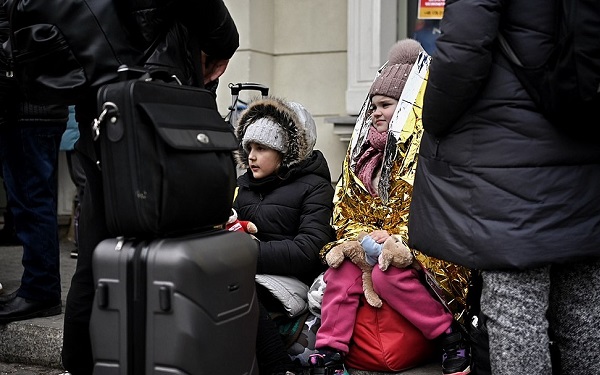
Council leaders have issued safeguarding and resource concerns, after the government opened its Homes for Ukraine scheme to unaccompanied children.
Levelling up secretary Michael Gove announced yesterday that 1,000 Ukrainian children who had already made applications under the scheme would be allowed to travel to the UK without their parents to stay with a sponsor, so long as they had parental consent.
Sponsors would – other than in exceptional circumstances – need to be personally known to the child’s parents, and need to commit to caring for the child for up to three years or until they turned 18 and the sponsorship had lasted six months.
As is the case with families with children housed under the scheme, enhanced DBS checks would have to be carried out on all those over 16 in the sponsor household who were not related to the child, before visas were issued.
The Department of Levelling Up, Housing and Communities (DLUHC) said “further security checks” would be conducted to ensure the safety of unaccompanied children though did not specify what these would be.
The DLUHC added that councils, who are responsible for checking the accommodation and living arrangements of all sponsors under the scheme, would be able to veto sponsorship arrangements for unaccompanied children where they deemed these unsuitable and would also need to undertake regular checks on all the children concerned.
It added that authorities would be able to use existing statutory powers to protect children where there were concerns. Existing guidance on the Homes for Ukraine scheme – which has not as yet been updated since the announcement – indicates that this involves assessing whether children are in need, under section 17 of the Children Act 1989, or require accommodation, under section 20.
Directors disappointment over lack of guidance
However, in its response, the Association of Directors of Children’s Services said it was disappointed that the DLUHC had not provided the “robust guidance” and “sufficient funding” that councils “urgently” needed to keep children safe and meet their needs.
The DLUHC said councils would receive the £10,500 per person plus sums of between £3,000 and £8,755 per child to cover childcare or education costs allocated generally under the scheme, but did not mention additional resource for unaccompanied children.
“We eagerly await the guidance to understand better what the expectations are for local authorities,” said ADCS president Steve Crocker, who highlighted, in particular, cases where a placement with a sponsor broke down.
“To keep children safe and to ensure their immediate and future needs can be met, it is vital that all the necessary checks are completed prior to visas being issued and that funding is forthcoming before checks are undertaken,” he added. “Should the situation arise where a child’s placement breaks down, the legal status of those children and the role of the local authority needs to be clearly set out in guidance.”
More on Ukraine
The Local Government Association also raised safeguarding and funding concerns.
“We do have real concerns about the potential for children to come to stay with adults they don’t know or don’t know well, and we want to ensure there are effective checks in place given there will always be people who abuse these systems and who pose a significant threat to children travelling on their own,” said LGA chair James Jamieson.
‘Over-stretched’ social workers
“Any additional new scheme would require already-overstretched councils and children’s social work teams to manage a significant level of risk to keep children safe.”
However, he said the LGA was pleased that the government was working with councils to “develop a robust system that puts in place appropriate safeguards and minimises the risks to children while ensuring we can play our part in supporting the people of Ukraine”.
Crocker also raised concerns about the number of different schemes for settling unaccompanied children in the UK, such as that related to young people coming from Afghanistan.
He said it would be “important for government to consider these schemes together to understand the pressures on the system as a whole and to ensure equity between the different schemes”.
Ukrainian families ‘having to make difficult decisions’
Minister for refugees Lord Harrington said: “We have seen the demand for allowing children to travel on the Homes for Ukraine scheme with parental consent. We have seen many applications where families want their children to travel to safety in the UK but where parents cannot travel with them.
“We understand families are having to make difficult decisions to separate from their children where it is in their best interest , which is why we have extended the Homes for Ukraine scheme to allow this.”




 Family help: one local authority’s experience of the model
Family help: one local authority’s experience of the model  ‘I spent the first three months listening’: how supportive leadership can transform children’s services
‘I spent the first three months listening’: how supportive leadership can transform children’s services  How senior leaders in one authority maintain a culture of excellence
How senior leaders in one authority maintain a culture of excellence  How staff support ensures fantastic outcomes for children and families
How staff support ensures fantastic outcomes for children and families  Workforce Insights – showcasing a selection of the sector’s top recruiters
Workforce Insights – showcasing a selection of the sector’s top recruiters 

 Facebook
Facebook X
X LinkedIn
LinkedIn Instagram
Instagram
Considering risk factors surely the bigger risk is being bombed, living underground, no access to adequate food and water, torture when captured, watching others receive dehumanising treatment.
Or is it more likely that their hosts will abuse them?